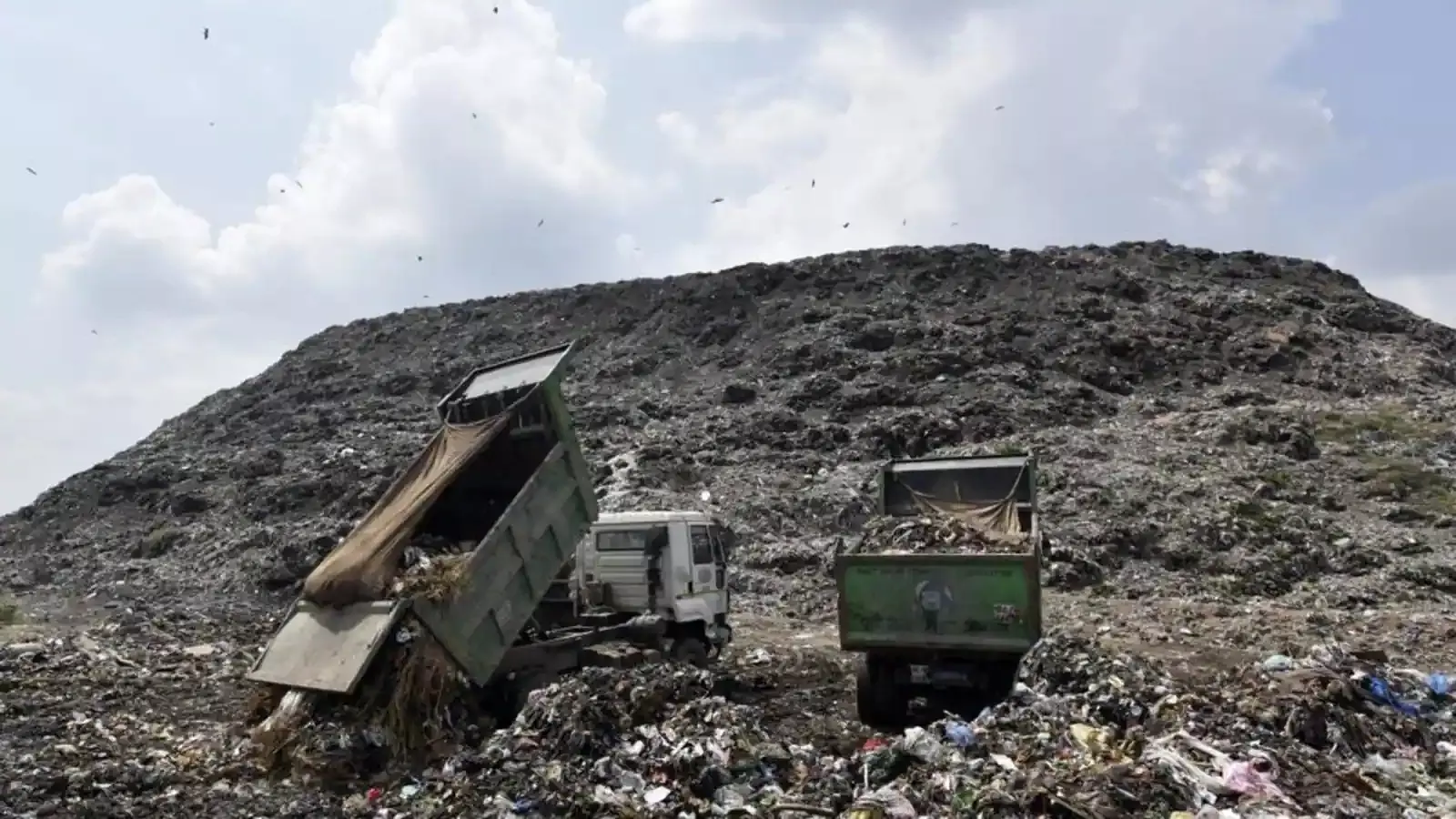
Blazing Inferno: The Ghazipur Fire and the Loop of Environmental Crisis
The Ghazipur landfill blaze epitomizes East Delhi's waste crisis. Overwhelmed by 2,000 tons of waste daily, the site is emblematic of inefficiency. Recurring blazes worsen Delhi's air quality, exacerbated by extreme weather. Urgent reforms, including stringent regulations and community involvement, are imperative to avert future disasters. Ghazipur's inferno must ignite action towards sustainable waste management, safeguarding public health and the environment.
In the densely populated East Delhi, a soaring column of smoke marks a severe environmental and public health catastrophe. The recent fire at Ghazipur landfill, a massive waste site sprawling over 70 acres, has reignited concerns over waste management practices and worsening air quality in India's capital. Ghazipur, receiving about 2,000 tons of waste daily, has long exceeded its capacity, becoming a potent symbol of the city's struggle with waste management inefficiencies.
A Persistent Environmental Hazard
The Ghazipur landfill, a mounting garbage heap, is a grim testament to Delhi's waste management woes. This landfill has grown into a small mountain of refuse, reaching alarming heights and presenting an eyesore and a public health disaster waiting to happen. Its size and mismanagement lead to frequent fires, emitting toxic fumes, thereby deteriorating air quality to dangerous levels.
According to a report by the Centre for Science and Environment, the air quality index (AQI) near the landfill often spikes to hazardous levels, significantly impacting the health of thousands nearby.
When the waste at Ghazipur catches fire, it releases a lethal cocktail of harmful gases, including methane, carbon monoxide, and dioxins, directly attributed to the decomposition of organic waste and burning plastics. These emissions contribute to a range of respiratory ailments among the local population, from chronic bronchitis to asthma and other severe pulmonary conditions. Additionally, the fires exacerbate the already dire air pollution situation in Delhi, which frequently ranks among the cities with the worst air quality globally.
Weather and Waste Woes: A Compounding Factor
Delhi’s climate exacerbates the landfill fire risk. The region's blistering heat waves, with temperatures soaring above 40 degrees Celsius and low humidity, create ideal conditions for fires to start and spread rapidly. These extreme weather conditions are becoming more frequent and intense due to climate change, suggesting that landfill fires could become even more common if preventive measures are not implemented.
Despite the recurring fires, there has been a lack of adequate response to improve the waste management infrastructure. The Ghazipur site lacks proper segregation and recycling facilities, and the firefighting measures are woefully inadequate to manage the scale of potential disasters. This situation indicates broader systemic issues in urban waste management, where rapid urbanisation, population growth, and insufficient policy implementation strain existing infrastructure.
Needed: A Shift in Policy and Practice
The mounting waste crisis not only burdens landfills but also contributes significantly to air and water pollution, posing a threat to public health and ecological balance, and the Ghazipur fire serves as a stark reminder of the urgent need for comprehensive waste management reforms in Delhi and beyond. From stricter regulations on waste disposal to investment in sustainable alternatives, concerted efforts are required to address the root causes of such environmental disasters and safeguard the well-being of citizens and the planet. According to data from the Delhi Pollution Control Committee, the city generates over 10,000 tons of waste daily, with only a fraction properly treated or recycled.
Stricter waste disposal regulations, improved waste segregation at the source, and significant investment in recycling technologies are critical steps needed to address the underlying issues of landfill management. Adopting modern waste-to-energy technologies could significantly mitigate the problem by reducing the volume of waste that ends up in landfills while generating energy.
While the only feasible solution appears to be waste segregation and management, waste recycling is the ideal option. However, recycling plants and technologies come at a massive price, thereby making its large-scale implementation a near-impossible ask. The rate at which trash is produced and implementing a financially feasible and equally effective waste management system is on top of the priority. However, what can be done to precipitate the rapid implementation of such a system?
The Ghazipur landfill crisis should serve as a catalyst for urgent action towards sustainable waste management practices. It highlights the necessity for an integrated approach involving government, private sector stakeholders, and local communities. Public education campaigns can play a pivotal role in changing public attitudes towards waste disposal and recycling. Moreover, community participation in waste management processes can significantly improve the effectiveness of implemented policies.
Envisioning a Greener Tomorrow
Innovations in waste processing and recycling technologies, such as composting organic waste, converting waste to biofuel, and implementing advanced sorting technologies, can dramatically reduce the reliance on landfills. These technologies address waste volume and contribute to the circular economy, making waste management more sustainable and less harmful to the environment.
Local administrative bodies need to be proactive. Involvement of corporates and handing over the entire task to private bodies is seen as a possibility. State and central government incentives for all stakeholders can be a lucrative way to resolve the situation partially. However, the problem must be tackled at the grassroots level, i.e., households. Awareness and education about waste segregation and disposal procedures can address a significant portion of the issue.
The fire at Ghazipur landfill is a stark reminder of the urgent need for effective waste management solutions. As Delhi continues to grow, the lessons learned here should inspire not just local but global actions towards better waste practices. Effective management of urban waste is crucial for maintaining public health and safety and ensuring our planet's ecological and environmental well-being.
The road to recovery begins with acknowledging the scope of the problem and committing to actionable solutions that prevent future catastrophes like the Ghazipur fire. Implementing these changes and efforts is essential for creating a sustainable, efficient, health-conscious urban environment.

